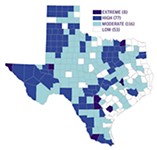Kimley-Horn Is Staff Pick
National engineering and planning firm recommended to be Strategic Mobility Plan consultant
By Katherine Gregor, 12:04PM, Mon. Nov. 2, 2009
City staff recommended Kimley-Horn for the city's $1 million strategic mobility plan (For details, see council agenda backup on Item 17). While a dynamic and sophisticated team on many counts, K-H lacks the California experience of finalist Fehr & Peers using transportation planning to reduce GHG emissions.
As last Friday's blog posts discussed, experience reducing greenhouse gas emissions through transportation planning was left out of the city's selection criteria for a Strategic Mobility Plan consultant. On Oct. 22 the two finalist teams vying for the job – Fehr & Peers and Kimley-Horn & Associates – presented their proposals to City Council. Neither finalist mentioned climate protection in its allotted 10 minutes. Nor did council members ask about their experience structuring transportation/mobility plans to reduce carbon emissions.
According to participants, questions from council would have been their only chance to address the issue; neither the Request for Qualifications nor the prior interviews by staff delved into the details of climate protection, beyond broad references to sustainability.
Austin Energy has a “Generation and Climate Protection Plan.” So why aren’t we hearing about a “Mobility and Climate Protection Plan” from the transportation department? (Maybe because the Climate Protection Program is wholly housed at Austin Energy. Then there's the political reality that rail transit projects go to the voters, but solar farms and wind-energy purchases don’t.)
On Thursday, Nov. 5., council is posted for final selection and authorization of an agreement, for a fee of up to $1 million. Yet experience setting GHG-reduction targets shows up nowhere in the selection criteria. Council nearly always follows the staff recommendation – so the opportunity may already have been lost.
I made my own quick review of prior plans provided by Kimley-Horn; I saw no evidence that they've helped cities or other clients establish GHG-reduction targets for transportation plans. Climate-action showed up only in broad comments like "A commitment to reducing the region’s carbon footprint is a motivating factor, too." Their team's Brownsville Metropolitan Planning Organization Transportation and Land Use Study, completed Sept. 2009 and parallel to CAMPO's 2035 plan, does compare GHG emissions under three different development scenarios – but none are aggressive enough to significantly move the CO2 needle.
By contrast, the other finalist firm, Fehr & Peers, provided state-level and Caltrans plans done in California (under California Climate Law, SB 375) in which aggressive reductions of GHG emissions are a critical performance measure. [It may be posted online with a Thursday feature story on green transportation.] California policy for reducing greenhouse gas emissions from cars explicitly includes changing land use patterns and improved transportation. The level of detail in these recommendations is the real stuff – impressive. The report states, "Since transportation is such a significant contributor of greenhouse gases, policies to improve the efficiency of the transportation system must be a central component of the solution." It also includes an informed discussion of "Climate Funding for Transportation Planning" and of advocacy needed at the federal level to ensure that transportation dollars achieve GHG goals.
I don't know how strong a role Fehr & Peers had in this work, and I'm no expert on hiring a transportation planning consultant. But one might think a consultant's experience working in California, which already requires GHG reduction targets for the transportation sector, would be of obvious value for Austin – if indeed we intend to follow our own climate-action mandate.
Kimley-Horn, on balance, is very strong and may indeed be the best team for the job. But the city's failure to even evaluate climate-action expertise as a selection criteria represents a huge missed opportunity.
Got something to say on the subject? Send a letter to the editor.
A note to readers: Bold and uncensored, The Austin Chronicle has been Austin’s independent news source for over 40 years, expressing the community’s political and environmental concerns and supporting its active cultural scene. Now more than ever, we need your support to continue supplying Austin with independent, free press. If real news is important to you, please consider making a donation of $5, $10 or whatever you can afford, to help keep our journalism on stands.
April 13, 2023
Aug. 6, 2010
July 30, 2010
Mobility, Transportation, Climate Protection











